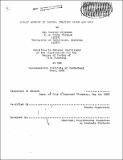Public housing in Boston : chanigng needs and role
Author(s)
Hipshman, May B., 1919-
DownloadFull printable version (10.26Mb)
Other Contributors
Massachusetts Institute of Technology. Dept. of City and Regional Planning.
Advisor
Bernard J. Frieden.
Terms of use
Metadata
Show full item recordAbstract
Boston's public housing program is plagued with problems, both social and physical, some of which are common to housing authorities throughout the country, and some of which are unique to Boston. The Boston Housing Authority has been under attack from civil rights groups for racial discrimination, and from other liberal groups for its out-moded policies and philosophies. The members of the 5-man Authority have been criticized as unqualified, politically-motivated, and lacking in understanding of the special needs of the problem families who are increasingly the inhabitants of public housing. In spite of a waiting list of 4,500 families, no new family public housing has been built in Boston in 13 years. Although several new programs -- leased housing, turnkey, rehabilitation, rent supplement -- have been tried, none is operating with maximum effectiveness. Increasing vandalism, crime, disrepair, and tenant complaints about indifferent managers, indolent maintenance men, and unreasonable tenant regulations, all attest to a need for re-evaluation of the program. This thesis is, in essence, a case study of the Boston Housing Authority. It examines the organizational structure, the policies, and the operations of the BHA, and describes the people who run it: the Board, the Administrator, the department heads, the project managers, the staff. It analyzes present BRA programs, and assesses their effectiveness in the face of today's needs. It identifies those inadequacies which are the result of internal BHA management and structure, and those which are the result of state and federal legislation over which the BHA has little direct control. It attempts to evaluate the extent to which political patronage and nepotism -- in selection of tenants, in hiring of employees, in appointment of Authority members -- affect the program and its operation. In the concluding sections, recommendations are made for changes that seem indicated: Those which could be made within and by the BHA itself, those which could be made only by the Mayor of Boston, and those which would require legislative action at both state and federal levels. In brief, the thesis asks, "What is wrong with Boston's public housing program?" and suggests what could be done to improve it if the citizens of Boston want a more vigorous and viable program.
Description
Thesis (M.C.P.)--Massachusetts Institute of Technology, Dept. of City and Regional Planning, 1999. "June, 1967." Includes bibliographical references.
Date issued
1999Department
Massachusetts Institute of Technology. Department of Urban Studies and PlanningPublisher
Massachusetts Institute of Technology
Keywords
City and Regional Planning.